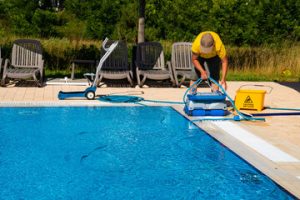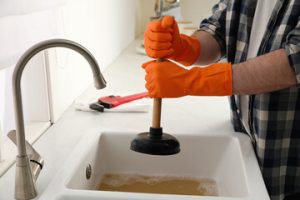Keeping your pool clean can prevent infections and irritations caused by bacteria. This includes gastroenteritis, ear infections, and skin issues.
Weekly checks and cleaning are necessary for your pool to function properly. This involves backwashing the filter (if it’s a sand filter) or removing the cartridge and rinsing with a hose to clear away accumulated debris. Keep reading or Find Out More Here.

Prevents Algae and Bacteria Growth
Algae is not only unsightly and smelly; it poses health risks for swimmers. Dangerous bacteria thrive in pools contaminated by algae, and their slippery consistency can lead to slips and falls. Proper pool maintenance prevents algae growth by keeping your water clean and ensuring that it has a healthy chemical balance.
Skimming the surface regularly and vacuuming the pool floor eliminates debris that can block the water flow, depriving algae spores of their growing environment. Brushing the walls and floor of the pool also removes algae from cracks and crevices. Shocking the pool kills existing algae and prevents future blooms. It’s important to remember that different types of algae require their own level of shock treatment.
Stagnant water and poor filtration are ideal breeding grounds for algae, which can quickly multiply. Regular sanitising keeps the pool free from chemicals that encourage algae growth, and regularly testing the water ensures proper chemical balance.
In addition, running the pool pump at least 6-8 hours a day ensures that your water is always moving and less prone to algae growth. Using a pool cover when the pool is not in use keeps debris and dirt out and reduces evaporation, which can add to the problem. A properly functioning filter and a balanced pH will also discourage the growth of algae.
Keeps the Water Chemically Balanced
It is important to test your pool water regularly, adjusting the chemicals accordingly. If the pH is too low, metals in the pool may corrode; if it’s too high, chlorine may degrade and cause skin rashes or eye irritation. Ideally, the pH should be between 7.0 and 7.6.
To help keep your water in balance, a chemical system is often used that releases copper and silver ions to control the pH. In addition to this, many pools are equipped with a filter that aids in circulation and catches debris, helping prevent clogging. Depending on the type of filter you have, you’ll need to clean and backwash it daily or weekly to ensure proper function.
The other major part of balancing your pool is adding sanitizers, which are used to kill bacteria and other contaminants. Chlorine is the most common sanitizer and is added to the water using tablets, liquid, or powder. The level of chlorine in the water is tested with testing strips or a kit that contains reagents for more precise results.
Keeping the water clean also helps maintain its balance, and a good way to do this is to skim the surface with a skimmer net and vacuum the bottom of the pool once per week. This will remove floaters, leaves, and other debris that could block the filter.
Prevents Damage to Equipment
Besides the water, pool equipment like pumps, filters, and heaters also requires routine cleaning to keep them functioning well. If left neglected, these components can become damaged or break down completely, requiring costly repair or replacement. Following the recommended maintenance procedures and schedules can help avoid these problems.
For instance, regular brushing and vacuuming can prevent mineral buildup that may damage liners and tiles. This prevents surface damage and helps the water stay clean with less strain on the filtration system. Another example is regularly emptying skimmer baskets and checking return jets to ensure they are free of debris. This allows the filtration system to operate efficiently and prevents the buildup of organic matter in the skimmer baskets that can disrupt the chemical balance.
Proper maintenance can also extend the lifespan of equipment. Keeping the water chemistry balanced, maintaining proper water levels, and repairing equipment promptly when needed can reduce costs and increase efficiency.
Aside from regular cleaning, other measures that can extend the life of your pool equipment include adjusting pool chemicals during the seasons, using a pool cover, and upgrading obsolete parts when available. These simple steps can dramatically reduce your energy costs and help you save on repairs and maintenance. In addition, properly storing equipment in a dry environment can protect it from extreme temperatures and weather conditions.
Prevents Unauthorized Access
Owning a pool is a great way to enjoy the outdoors and stay active, but it also comes with a lot of responsibility. Regular cleaning and maintenance will help you to avoid health risks, keep your pool safe for swimming, and extend its lifespan.
Testing water quality and adjusting chemicals are important parts of pool maintenance, but it’s equally essential to maintain safety barriers and equipment. Installing a secure fence around the pool and ensuring that gates are secured with self-closing and locking latches will prevent unauthorized access to the pool area. Adding an alarm that will detect unauthorized movement in the pool area and having rescue equipment like life rings and first aid kits readily available are additional ways to ensure your family’s safety while enjoying the pool.
Ensuring compliance with local pool safety standards isn’t just a legal obligation, but it’s an essential step in protecting your loved ones from accidents and injuries. In addition to performing regular maintenance and testing water quality, it’s a good idea to learn CPR, post emergency phone numbers near the pool, and encourage family members to participate in lifesaving training. This will help to reduce the risk of fatal accidents while fostering a healthy and enjoyable swimming experience for everyone. Regular maintenance also includes taking steps to prevent damage from the elements, such as winterizing your pool with a thorough process that includes balancing the water chemistry, lowering the water level, and protecting equipment.


